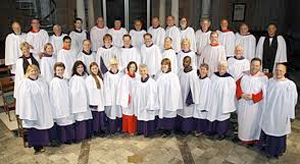by J.D. Goddard

In the nineteenth century it was not unusual for orchestral compositions to be arranged for piano, thus making in-home performances more readily available. Brahms completed his German Requiem in 1868, and immediately prepared a scaled down version of the work for piano four hands and chorus. It was actually premiered in a home in 1872.
This scaled-down piano version is not without interest, but those who are used to hearing the orchestral version may find it softened and somewhat bland. Though Brahms did not intend listeners to this non-liturgical requiem to shudder in fear for their souls, it is impossible not to feel a sense of guilt and veneration when lambasted by a massive chorus with full orchestra. Heard as it was this evening, this requiem became a gentler work but the intensity and emotional involvement of the singers made for a deeply religious experience.
Brahms professed that he could have named this his “Human Requiem”, with its focus on comforting the living, and this is particularly apropos for the first movement. Under Wilson’s leadership the music comforted, calmed and suggested hope, while still acknowledging the tragedy of death. The choir and pianists came close to the heart of it, bringing out its romantic nuances, grasping Brahms’s emotional integrity and sustaining the drama from movement to movement.
The second movement (Denn alles Fleisch, es wie in Gras) proved to be the one missed step in the piano four-hand version. Though wonderfully dramatic in thrust and nuance, without timpani it sounded weightless and lacking in substance.
The chorus followed baritone Zachary Rusk’s lead in his lithe Herr, lehre doch mich, and kept up the emotional momentum through the soothing Wie lieblich sind deine Wohnungen. In the exquisite Ihr habt nun Traurigkeit. Judith Overcash’s alluring soprano depicted the romantic tenderness of a mother’s comfort. Ray Liddle’s Denn wir Haben hie keine bleibende Stadt was straightforward but well thought-out with expressive dynamics.
The chorus sang with admirable intensity and fine diction. Wilson maintained a steady beat while allowing moments of expressive flexibility and observing every rise and fall in dynamic markings. Pianists DeMio and Lenti were well-matched and conveyed a wonderful sense of romantic style and flow.
Judith Eckelmeyer’s astute program notes greatly enhanced the listener’s understanding of just who the “romantic Brahms” really was and why his Requiem is at once so intellectual yet emotionally euphoric.
Published on ClevelandClassical.com April 2, 2013
Click here for a printable version of this article.



